
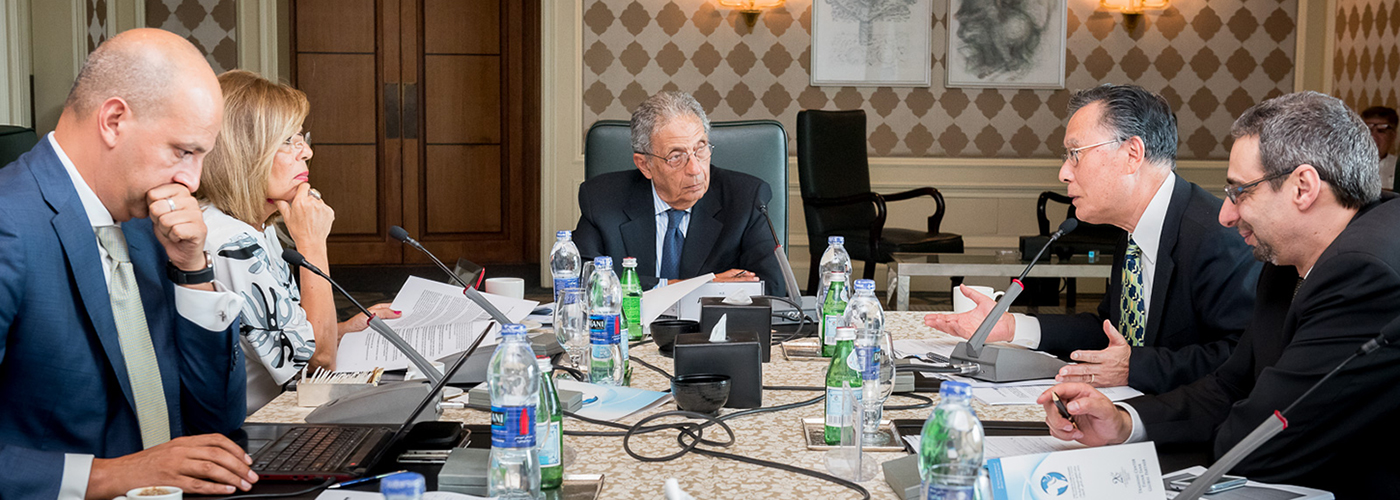
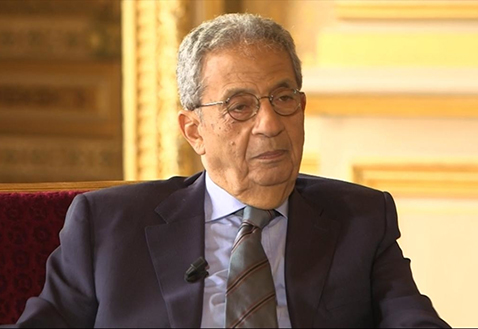

Permanent Representative of Egypt to the U.N (1990-1991), Foreign Minister of Egypt (1991-2001), Secretary General of the League of Arab States, (2001-2011).
Moussa ran for President of Egypt after the 25th of January Revolution, then was elected in the Constitutional Committee 2012 and led the Liberal members' efforts for a more liberal Constitution.
Moussa then founded the Congress party. He was the convener of the initial meeting of the Egyptian opposition (National Salvation Front) against the Presidential dictatorial constitutional decree in 2012that caused it to be retracted.
Moussa was among the leaders who strongly supported the June 30th revolution that deposed ex-president Morsi. Moussa was then elected Chairman of the 2013 "50 memberCommittee"which draftedthe existingConstitution of Egypt.
He was awarded several orders and decorations Egypt, Jordan, Qatar, Brazil, Argentina, Germany and Ecuador.
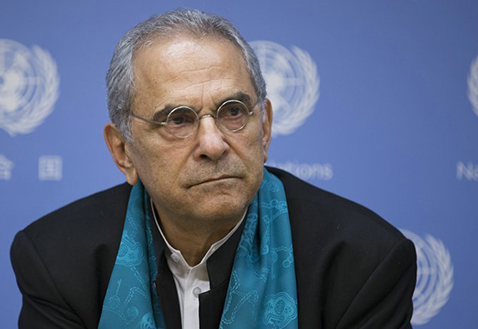

Ramos-Horta began his career as journalist in 1969 in Timor-Leste. He was a co-founder of FRETILIN, the Revolutionary Front for the Independence of Timor-Leste.
On 28 November 1975, after more than 400 years of Portuguese occupation, FRETILIN proclaimed independence and established the Democratic Republic of Timor-Leste. Ramos-Horta was appointed FRETILIN’s Minister for External Affairs and Information. He was asked to go overseas to gain international support for the new country.
On 4 December 1975 José Ramos-Horta left Timor-Leste for New York. Three days later, Indonesia invaded and occupied the island. He addressed the United Nations Security Council leading to the adoption of unanimous resolution demanding the withdrawal of Indonesian forces from Timor-Leste.
From 1975 to 1999 Ramos-Horta was the permanent representative of FRETILIN at the United Nations. He traveled extensively lobbying governments and creating networks of supporters around the world.
In December 1996 José Ramos-Horta and Bishop Carlos Belo were awarded the Nobel Peace Prize for “their work towards a just and peaceful solution to the conflict in Timor-Leste”.
In December 1999 Ramos-Horta returned to his homeland for the first time in 24 years. In 2002, he was appointed Minister of Foreign Affairs and Cooperation.
On 10 July 2006 he was sworn in as the Prime Minister of Timor-Leste following the resignation of then Prime Minister Mari Alkatiri. In 2007 he was elected and was sworn in as the second President of Timor-Leste.
Following a coup d'Etat in Guinea-Bissau, Ramos-Horta was asked by the UN Secretary-General to mediate the conflict. From January 2013 to July 2014 he served as the UNSG Special Representative for Guinea-Bissau.
In 2014-2015 he chaired the High Level Independent Panel on UN Peace Operations.
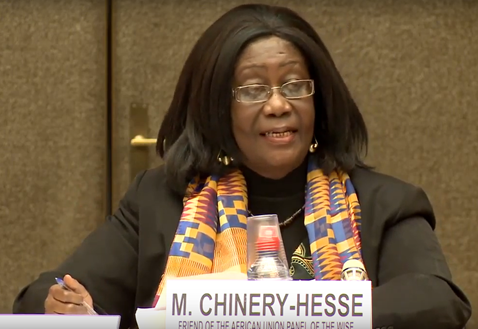

Dr. Mary Chinery-Hesse has had distinguished careers in her Country’s Civil Service and at the United Nations. In the UN and in numerous other Organizations she continues to be an important voice on economic development issues, an ardent defender of human rights, particularly women’s rights and empowerment, and gender equality, as well as an active advocate for African imperatives. A graduate of London University, she holds an Honor’s Degree from the University of Ghana in Sociology and Economics and was awarded a Doctorate of Law (honoriscausa) by her Alma Mater the University of Ghana, the first female product of the University of Ghana to be so honoured. At the University of Dublin she undertook Post-Graduate Programs in Development Economics, and also at the World Bank Institute in Washington D.C. where she was inscribed as a Fellow of the Institute.
Dr. Chinery-Hesse's first post at the United Nations was that of Resident Coordinator at the UN System and Resident Representative in the United Nations Development Programme in 1981, serving in New York, Sierra Leone, Tanzania, the Seychelles and Uganda. She was the first ever African woman to be appointed to that position. She was then appointed in 1989 as the first ever woman Deputy Director-General of the International Labour Organization (ILO ), after seventy years of the founding of that UN Specialized Agency, a position with the rank of Under Secretary-General of the UN. Again this gave her the distinction of being the first African woman to attain a position equivalent to that of Under Secretary-General in the history of the United Nations. She also served as Chairperson of the UN’s Consultative Committee on Programme and Operational Questions (CCPOQ) for several years.
Dr. Chinery-Hesse’s studies and experiences led logically to her appointment upon her retirement from the UN as the Chief Advisor to the President of the Republic of Ghana, in the Cabinet of President John Kufuor. She also was Vice-Chairperson of the Ghana National Development Planning Commission, and a Member of the Board of the Centre for Policy Analysis. In her younger days, she was Permanent Secretary in the Ministry of Finance and Economic Planning of Ghana. She has as well served on the Council of the University of Ghana.
She currently serves on the Board of the African Think Tank, the Centre for Conflict Resolution in Cape Town, South Africa. Among her myriad high-level posts was membership on the Council of African Advisors of the World Bank, the Eminent Persons Advisory Panel of the African Union, and Chairperson of the High-Level Panel on Review of Progress in Implementing the Programme for Least Developed Countries. She was as well the Chairperson of the Commonwealth Expert Group on Structural Adjustment and Women. Other significant appointments have included Membership of the Zedillo Commission on Financing for Development, and the UN Blue Ribbon Panel on Threats, Challenges and Change. She as well was a Member on the Board of the Global Humanitarian Forum in Geneva, Switzerland. For many years, she was a Member of the Board of Trustees of the Voluntary Fund for Technical Cooperation of the UN High Commissioner for Human Rights in Geneva, which she also chaired. Her advice continues to be actively sought by many Governments and International Organisations on a variety of themes. She is as a result very busy in retirement. She serves on the African Union Panel of The Wise, and on the PanAfrican Network of the Wise. She chairs the Council of the Centre for Regional Integration in Africa, among other things.
Dr. Chinery-Hesse who is the current Chairperson of Zenith Bank Ghana has received several prestigious awards and decorations both nationally and internationally, including the highest National Award, the Order of the Star of Ghana.
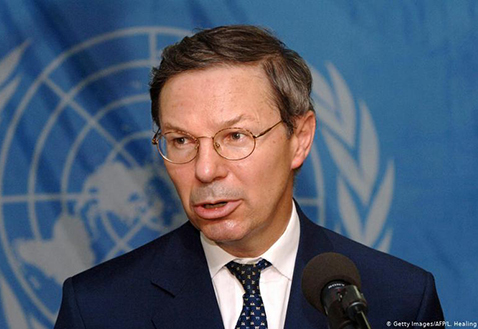

Jean-Marie Guéhenno is a nonresident senior fellow in the Project on International Order and Strategy in the Foreign Policy program at Brookings and a member of the U.N. secretary-general's High-Level Advisory Board on Mediation. From 2014 to 2017, Guéhenno was president and CEO of the International Crisis Group. He is an expert in peacekeeping, global governance, and transnational security threats.
As the undersecretary-general for peacekeeping operations at the United Nations from 2000 to 2008, Guéhenno became the longest-serving head of peacekeeping. He led the biggest expansion of peacekeeping in the history of the United Nations.
Before joining the United Nations, Guéhenno had a distinguished career in the French government and in the private sector. He was the director of policy planning in the French Ministry of Foreign Affairs from 1989 to 1993. He has also been ambassador to the Western European Union, and chairman of the French Institute of Higher Defense Studies.
Guéhenno has published articles in many newspapers and magazines, and is the author of the “End of the Nation-State” (University of Minnesota Press, 1995). He has been a professor at the École nationale d'administration and at the Institut d’Etudes Politiques of Paris.Guéhenno is officier de la legion d’honneur and has the commander’s cross of the German order of merit.
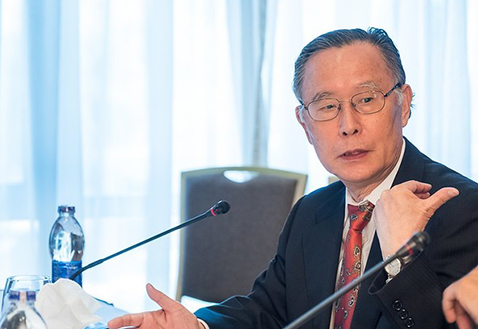

Dr. Sukehiro Hasegawa served as Special Representative of the Secretary-General for Timor-Leste and as Head of the United Nations Mission of Support in East Timor (UNMISET), the United Nations Office in Timor-Leste (UNOTIL), and the United Nations Mission in Timor-Leste (UNMIT) from May 2004 to September 2006. He served with the United Nations since 1969. He held several senior positions within the United Nations Development Programme (UNDP), the United Nations Volunteers (UNV) and United Nations peacekeeping operations. He was Deputy Resident Representative of UNDP in Nepal (1978–80) and Indonesia (1980–84). He later served as UNDP Resident Representative and Resident Coordinator of the UN operational activities for development in Samoa, the Cook Islands, Niue and Tokelau. In 1987, he was appointed Deputy Executive Coordinator of the UN Volunteers Programme in Geneva and in 1993, he managed the United Nations Volunteer electoral supervisors assigned to plan and administer general elections in Cambodia. In April 1994, he was appointed Director of Policy and Planning of the United Nations peacekeeping operation in Somalia, and in January 1995, he became the United Nations Resident Coordinator in Rwanda. He subsequently served as the Deputy Assistant Administrator and Deputy Regional Director for Asia and the Pacific at UNDP in New York. From July 2002 to May 2004, he served as the United Nations Resident Coordinator for Timor-Leste, and concurrently as Deputy Special Representative of the Secretary-General for Timor-Leste and Deputy Head of UNMISET. He holds a BA in Political Science from the University of Michigan, a MA in Public Administration from the International Christian University of Tokyo, and a PhD in International Relations from Washington University in St. Louis, Missouri. Dr. Hasegawa is member of the Board of Directors of Japan Association of United Nations Studies and member of the Earth Charter Commission for Asia and the Pacific. When ACUNS established its Liaison Office in Tokyo in 2017, he was appointed its first Director.
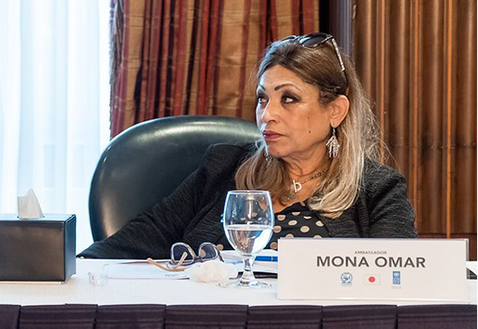

A public figure in the field of women rights and a regionally renowned career diplomat, Mona Omar has extensive experience representing and coordinating issues of strategic interest to women on the international, regional and national levels. She is a lecturer and regular speaker at international and regional conferences and on all forms of media.
Mona Omar is the founder and active board member of a number of organizations aimed at addressing key socio-economic issues affecting Egyptian and African development.
In 2013 Mona Omar assumed the position of the Secretary General of the National Council for Women for two years. Before this post, Mona Omar was Deputy Minister of Foreign Affairs for African Affairs (2008-2013).
In 2016, Mona Omar was elected by the Human Rights Council as a member of the Advisory Committee, with the membership term starting on 1st of October 2016, and ending on the 30th of September 2019.
Mona Omar is currently the President of the “Africa Center “ at the British University in Egypt “BUE” since 2014.
As a career diplomat from 1976 to 2013, Mona Omar’s experience ranges from the establishment of Egyptian embassies and representation offices in the immediate aftermath of the genocide in Rwanda and apartheid in South Africa; to founding and actively engaging in the steering committee of the NEPAD (The New Partnership for Africa’s Development).
A recognized and active leader within the Ministry of Foreign Affairs, Mona Omar assumed a number of additional roles and responsibilities to official posts. These included, but were not limited to chairmanship of the Council of Assistant Ministers of Foreign Affairs and the chairmanship of the Diplomats Club during internal negotiations during the Egyptian revolution.
Mona Omar did her postgraduate studies in political science at the Faculty of Political Sciences and Economics at the Cairo University (1975-1976) and holds a Bachelor of Arts in Political Science, Faculty of Political Science and Economics from the same university (1971-1975).
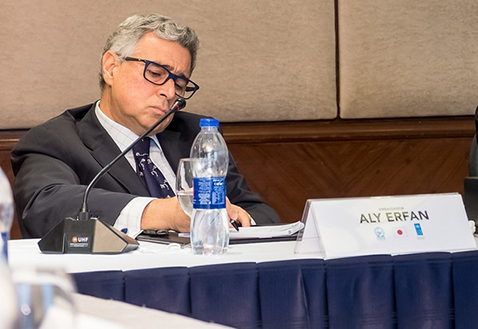

Ambassador Aly Erfan is currently a Professor of Practice in the School of Global Affairs and Public Policy (GAPP) of the American University in Cairo (AUC). In this capacity, he is the Director of the Masters in Global Affairs Program in the Department of Public Policy and Public Administration (PPAD) of the School.
He is also the co-managing editor of GAPP’s quarterly periodical, the Cairo Review of Global Affairs and the editor of the Policy Briefs Series issued by the school.
He supervises the development and maintenance of the Syria Reader and the Jerusalem Timeline; two research tools which provide a full chronology and contains a complete data-base for relevant milestone documents that relate to the Syria crises and to the struggle over Jerusalem.
Recently, he was appointed by the Foreign Minister of Egypt on the International Advisory Board of the Cairo International Center for Conflict Resolution, Peacekeeping and Peacebuilding (CCCPA).
Ambassador Erfan is an Egyptian diplomat, with a 30-year career in the Ministry of Foreign Affairs of Egypt and the League of Arab States. He has served for more than 20 years in the cabinets of three Egyptian Foreign Ministers and the Secretary General of the League of Arab States, during critical and eventful periods in the Middle East. In this capacity, he responsible for issues that included the Middle East Peace Process, regional crises, arms control, Arab-Israeli affairs, Arab-American relations, Arab-EU relations as well as UN affairs.
His most recent official position was Chef de Cabinet and Political Advisor to the Secretary General of the League of Arab States during the critical years of the “Arab Spring’, 2011-2016.
Throughout his diplomatic career, Ambassador Erfan has also been a member of the Egyptian and Arab League delegations to multiple regional and international organizations, summits and conferences, including to numerous UN General Assembly sessions, Security Council meetings, several international, Arab and regional summits and ministerial conferences and meetings (relating to the Middle East Peace Process, the Arab League, Syria, Libya, Yemen..etc), the Multilateral Peace Process (the Steering Committee and the Working Group on Arms Control and Regional Security) and to NPT Review Conferences.
His teaching and research interests include the Arab-Israeli conflict, regional security, international security, international negotiation, current Middle East affairs, as well as regional and international organizations as they relate to Middle East conflicts and crises.
Ambassador Erfan received his Bachelor of Arts degree in Political Science from the American University in Cairo and his Master of Arts degree in Area Studies (Near and Middle East), from the School of Oriental and African Studies (SOAS), University of London.
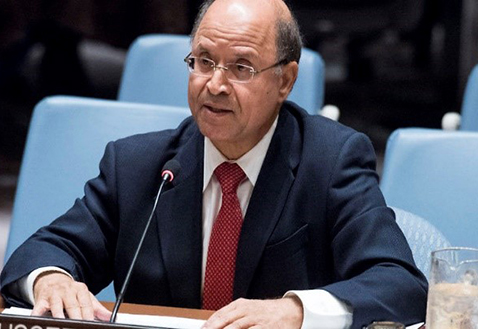

Dr. Youssef Mahmoud is Senior Adviser at the International Peace Institute (IPI) supporting the Africa, Middle East, and peace operations programs and serving as focal point on mediation and prevention policies and practices. Before retiring from the United Nations in January 2011, he was the Secretary-General’s Special Representative and Head of the UN Peacekeeping Mission in the Central African Republic and Chad. From 2007 to 2009 he served as Executive Representative of the Secretary-General and Head of the UN Integrated Peacebuilding Office in Burundi.
Prior to these assignments, he held several other senior positions, notably as United Nations Resident Coordinator in Guyana, Director in the UN Department of Political Affairs, and Head of the Office of the Undersecretary-Secretary-General for Political Affairs.
He recently served as member of the UN Secretary-General High Level Panel on Peace Operations (HIPPO) and simultaneously a member of the High Level Advisory Group for the Global Study on Security Council Resolution 1325 on Women, Peace and Security.
He periodically writes on political transitions in Africa, with particular focus on Tunisia, and is currently a Visiting Professor at the African Leadership Centre, King’s College, London.
He serves on the Boards of several non-profit organizations in the US and Tunisia, including Al-Bawsala, a Tunisian NGO that aims to put citizens at the core of political action.
Dr. Mahmoud has a PhD in Linguistics from Georgetown University, Washington, D.C.





